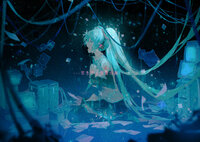(This started as a response to another discussion thread by @REDD that I kept expanding until it needed its own write-up.)

[via pixiv のくはし]
I think part of the difficulty in characterizing Miku is due to her being more of a meta-character instead of a character in the traditional sense.
From the beginning Miku has been portrayed as being self-aware of her simultaneous existence as software, a virtual idol, and community shared character. Some of her earliest songs are from her own perspective, with lyrics about herself learning to sing as each producer learns to use the Vocaloid software. She is commonly portrayed working alongside her producer and encouraging them not to give up and to work toward their dreams and goals. A few examples:
- Hajimete no Oto (The First Sound): "What was your first sound, the first sound you made? For me, this is mine. That's why right now I'm happy. What was your first word, the first word you said? I cannot say words. That's why I sing like this."
- Miku Miku ni Shite Ageru: "I've come here surpassing the limits of science. I've got no leek with me but I would like some. Hey, let me into your computer now. Why linger? I'm looking from my package all the time at you."
- Watashi no Jikan (My Time): "I’m a virtual idol~ Although I have prepared to become a super star, But will I be accepted by this real world?"
- Electric Angel: "I love to sing It's not because I was made like that. It's because you, who say you like my voice are pleased with it. I don't understand anything but zeroes and ones. But you taught me the meaning of "I".

[via pixiv]
In many ways Miku has grown and changed as the fanbase has grown and changed over the years. Like a child learning about the world, Miku explored more and more ideas, feelings, and concepts. Things like: ego ("World Is Mine"), love/desire ("Melt", "Love is War"), separation ("Saihate"), frustration ("Owata"), rebirth ("Hello, Planet"), transience ("Last Night, Good Night"), loss ("VOiCE"), darkness ("Alice of Human Sacrifice"), brutality ("Daiben"), longing ("Though My Song Has No Form"). (Not a perfect list of early examples, but I hope you get my meaning.)

[via pixiv A, B, C]
Miku took on countless roles and appearances for the thousands of songs she became a part of. Each an individual expression from a producer, but all of them using Miku as a shared symbol. In this way she has proven to be a uniquely versatile character. The breadth and spectrum of tones and styles she has been adapted to is astounding. Outside of specific works, she has been generally portrayed as wanting to help others succeed and is willing to play any part needed.
We might say that her persona is a combined reflection of all the fans, producers, artists, and the people who work behind the scenes on her software, events, and products. And what would that be exactly?
A common theme in Vocaloid music is inner struggle. Expressions of anxiety, depression, loss, grief, weakness; but also equal expressions of empathy and encouragement. Another theme is the individual versus society. In the comments below such songs is an outpouring of understanding and commiseration among the fans. Still, there are plenty of jubilant songs of positivity and camaraderie. There is also a long history of storytelling through song in the Vocaloid community.

Much of the content in Vocaloid songs is very personal in nature. People use Miku as a means to express things they wouldn't feel comfortable expressing as themselves. Creators putting so much of themselves into their work seems to give Miku a sense of being "real" and genuine. It can seem like a paradox given her entirely synthetic nature. Perhaps the small scale of most productions lets the human touch shine through where it might have otherwise been lost in a production backed by a huge team.
New fans often credit Miku herself as being the author of her songs, until they learn what the Vocaloid software is and start to become familiar with the various producers. I think it is an easy mistake to make due to this subtle sense of reality she has. I have not personally met any real life celebrities of the entertainment industry. I only see them in media. In that way, Miku as a virtual idol is just as "real" to me in practical terms as any human idol would be. Just think of how much of the real world we all experience solely through a monitor or screen. So many people and places I know to be real, yet I've never seen or experienced them in-person.
Perhaps that's why it is so easy for people to imagine and depict her as walking among us in the real world. And why it is so easy for us to suspend our disbelief when we see her performing "live" at concerts.

[via pixiv A, B, C]
That personal relationship many of us feel with her, is actually a feeling of connection to the Vocaloid community and creators. For years I never thought of myself in terms of being a "Miku fan." She was just always there in the background. Just a part of my life. Then a couple years ago I suddenly seemed to notice that I had been listening to her music for over a decade. It really made me sit down and contemplate why that was. Since then I've been interacting with the community and writing posts like this, attempting to describe that reason "why."

[via pixiv]
I'm left to believe this "meta" nature of hers is the reason for her continued popularity. Well over a hundred voicebanks have been released after her. There are arguments to be made for many of them being preferable in one way or another. It's rare for something to outlast that kind of competition for such a long time.
It seems Miku had the chance to become something more than just a character or just a voicebank. I'm not sure that perfect storm of timing, traits, and circumstance can happen again. She arrived at the dawn of streaming video and the democratization of media creation. Art software, 3D animation software, and home music production software had all become fairly accessible around that time. It put creative tools in the hands of more people than ever before. And she became part of that movement.
But let's circle back around to the original question of Hatsune Miku as a character. If I had to come up with specific traits:
(In my view) She's obviously charismatic. She seems to value inclusivity. In a lot of fiction she comes across as easy-going, but turns very stern when someone hurts or upsets others. She strives for self-improvement but tends to not have specific personal goals or plans. Instead she focuses on helping others achieve the things they are working toward. Her tempered idealism and positivity can come across as naive to some people, but in truth she has been exposed to and understands all of the worst and all of the best in people, in all kinds of circumstances. She is prone to dwelling on the transience of all things.
Of course, if she is playing a role in a production she commits to it and can practically become a different person. Based on many of her various collaborations: she has that Japanese appreciation for limited and novelty foods and confections. She also likes theme parks and festivals; race cars and baseball; fashion and accessories; and kabuki theater.

[via pixiv]
I've gone on long enough. I could talk about this sort of thing all day long. Sorry if I went on too many tangents.
My perspective on the matter comes from my personal experience of listening to Miku and Vocaloid for over fourteen years now. I'd love to hear differences in perspective people have based on their time listening. Or maybe you see the IRL meta aspects as being separate from her as a character? Do you feel any other voicebanks/characters share some of these traits that I'm just not aware of? Did I bring up anything that was new to you, or were you already familiar with everything I talked about?











